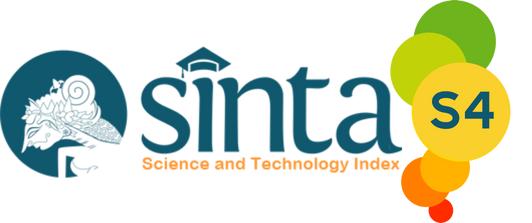Penggunaan Lembar Kerja Digital untuk Mengembangkan Keterampilan Komunikasi Mahasiswa pada Mata kuliah Telaah Kurikulum Fisika
DOI:
https://doi.org/10.29303/goescienceedu.v2i2.141Keywords:
Digital Worksheet, communication, LMSAbstract
This study aims to develop students' communication skills in the Physics Curriculum Study course through the use of Digital Worksheets. The subjects of this study were 23 students of class 5B. The student came from the Physics Education Study Program, University of Mataram, who attended the Physics Curriculum Study course in the odd semester of the 2021/2022 academic year. The research instrument used was a student communication skill observation sheet with three indicators. Observations were made online at the Learning Management System (LMS) equipped with Digital Worksheets on the Discussion Forum menu. Observations were made every meeting, namely 14 times using a 4-scale rating score. The increase in score from the first meeting to the last meeting was calculated using N-gain. The average score of student communication skills is 79.5 which is in good criteria. The improvement of students' communication skills based on the calculation of N-gain is 72.7 which is in the high category. Thus, the use of Digital Worksheets can develop students' communication skills in the Physics Curriculum Study course.
References
Ağaoğlu, O., & Demir, M. (2020). The integration of 21 st century skills into education: an evaluation based on an activity example. Journal of Gifted Education and Creativity, 7(3), 105–114.
Asari, A., Kurniawan, T., Ansor, S., Bagus, A., & Rahma, N. (2019). Kompetensi Literasi Digital Bagi Guru Dan Pelajar Di Lingkungan Sekolah Kabupaten Malang. BIBLIOTIKA: Jurnal Kajian Perpustakaan Dan Informasi, 3, 98–104.
Erg, R., Ekl, Y., & Lek, Z. D. (2011). The Effects Of Inquiry-Based Science Teaching On Elementary School Students ’ Science Process. Bulgarian Journal of Science and Education Policy, 5(1), 48–68.
Gerald, D. F., & Okey, J. R. (1980). A Test of the Integrated Science Process Skills for Secondary Science Students. University of Georgia.
Gusti, A. R., Afriansari, Y., Sari, D. V., & Walid, A. (2020). Penilaian Afektif Pembelajaran Daring IPA Terpadu Dengan Menggunakan Media Whatsapp. Difraction, 2(2), 65–73.
Hake, R. R. (1999). Analyzing Change/Gain Scores. In Indiana University (pp. 1–4). Indiana University. https://doi.org/10.24036/ekj.v1.i1.a10
Hidayatullah, Z., Wilujeng, I., Nurhasanah, N., Gusemanto, T. G., & Makhrus, M. (2021). Synthesis of the 21st Century Skills (4C) Based Physics Education Research In Indonesia. JIPF (Jurnal Ilmu Pendidikan Fisika), 6(1), 88. https://doi.org/10.26737/jipf.v6i1.1889
Hikmawati, H., Sahidu, H., & Kosim, K. (2021). Metode Diskusi Berbasis Learning Management System (LMS) Untuk Meningkatkan Kemampuan Berpikir Kritis Mahasiswa. 7(1).
Irhandayaningsih, A. (2020). Pengukuran Literasi Digital Pada Peserta Pembelajaran Daring di Masa Pandemi COVID-19. Anuva, 4(2), 231–240.
Karsli, F., & Sahin, C. (2009). Developing worksheet based on science process skills : Factors affecting solubility. Asia-Pacific Forum on Science Learning and Teaching, 10(1), 1–13.
Kemendikbud. (2013). Materi Pelatihan Guru: Implementasi Kurikulum 2013 - SMP/MTs - Ilmu Pengetahuan Alam. Badan Pengembangan Sumber Daya Manusia Pendidikan dan Kebudayaan dan Penjaminan Mutu Pendidikan Kementerian Pendidikan dan Kebudayaan.
Khoiri, A., Evalina, Komariah, N., Utami, R. T., Paramarta, V., Siswandi, Janudin, & Sunarsi, D. (2021). 4Cs Analysis of 21st Century Skills-Based School Areas. Journal of Physics: Conference Series, 1764(1). https://doi.org/10.1088/1742-6596/1764/1/012142
Liu, Z., Tretyakova, N., Fedorov, V., & Kharakhordina, M. (n.d.). Digital Literacy and Digital Didactics as the Basis for New Learning Models Development. 4–18.
Nahdi, D. S., & Jatisunda, M. G. (2020). Analisis Literasi Digital Calon Guru SD Dalam Pembelajaran Berbasis Virtual Classroom Di Masa Pandemi COVID-19. 6(2), 116–123.
Nurmaya, Y., & Zuhdi, M. (2021). Pengembangan Perangkat Pembelajaran Model Inkuiri Terbimbing Pada Materi Alat-Alat Optik Untuk Meningkatkan Penguasaan Konsep Fisika. Orbita: Jurnal Kajian, Inovasi dan Aplikasi Pendidikan Fisika. 7(1). https://doi.org/10.31764/orbita.v7i1.3835
Ozgelen, S. (2012). Students ’ Science Process Skills within a Cognitive Domain. Eurasia Journal of Mathematics, Science & Technology Education, 8(4), 283–292. https://doi.org/10.12973/eurasia.2012.846a
Rauf, R. A. . ., Rasul, M. S., Mansor, A. N. M., Othman, Z., & Lyndon, N. (2013). Inculcation of Science Process Skills in a Science Classroom Related papers. Asian Social Science, 9(8), 47–57. https://doi.org/10.5539/ass.v9n8p47
Sahidillah, M. W., Miftahurrisqi, P., Pendidikan, P., Indonesia, B., Universitas, P., & Maret, S. (2011). Whatsapp Sebagai Media Literasi Digital Mahasiswa. Pendidikan Bahasa Indondesia P, 52–57.
Sopantini. (2014). Reforming teaching practice in Indonesia : a case study of the implementation of active learning in primary schools in North Maluku. Reforming Teaching Practice in Indonesia : A Case Study of the Implementation of Active Learning in Primary Schools in North Maluku, September. https://manchester.idm.oclc.org/login?url=http...ProQ%3A
Surahman, E., Santaria, R., & Setiawan, E. I. (2020). Tantangan Pembelajaran Daring Di Indonesia. Journal of Islamic Education Management, 5(2), 94–95.
Tohara, A. J. T., Shuhidan, S. M., Bahry, F. D. S., & Nordin, M. N. bin. (2021). Exploring Digital Literacy Strategies for Students with Special Educational Needs in the Digital Age. Turkish Journal of Computer and Mathematics Education (TURCOMAT), 12(9), 3345–3358. https://www.turcomat.org/index.php/turkbilmat/article/view/5741







